Pashtun massacre in Mastung and the Baloch militants’ hall of shame
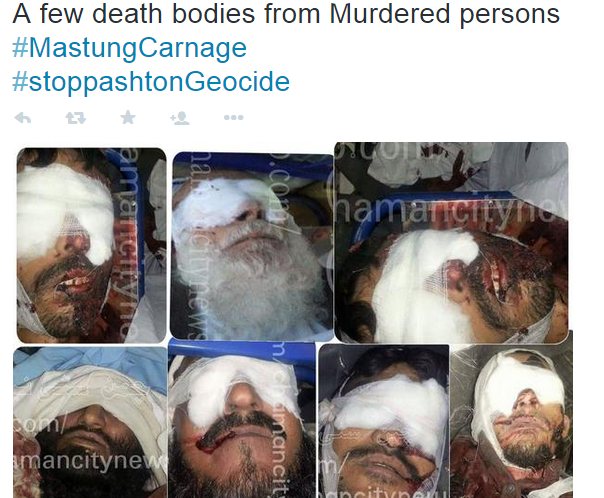
According to BBC and Dawn, United Baloch Army (UBA) of Mehran Marri has accepted claimed the masacre of Pashtuns in Mastung.
In the past, Baloch militant outfits including BLA, BLAF and UBA have claimed attacks on innocent civililans including Pashtun, Saraiki, Sindhi and Punjabi workers, settlers and visitors. At times, in order to save their face and public repute, they deny their role in such actions of violence or attribute them to unknown or shady factions of the Balochs. There is however sufficient evidence that all Baloch militant groups are united in terrorist activities and are also aligned with the banned Deobandi terror outfit ASWJ aka LeJ led by Ramzan Mengal, Rafiq Mengal and Manzoor Mengal. Just as ASWJ tries to distance itself from its own aliases LeJ and TTP’s terrorism, BLA, BLF etc try to distance themselves from UBA’s terrorism.
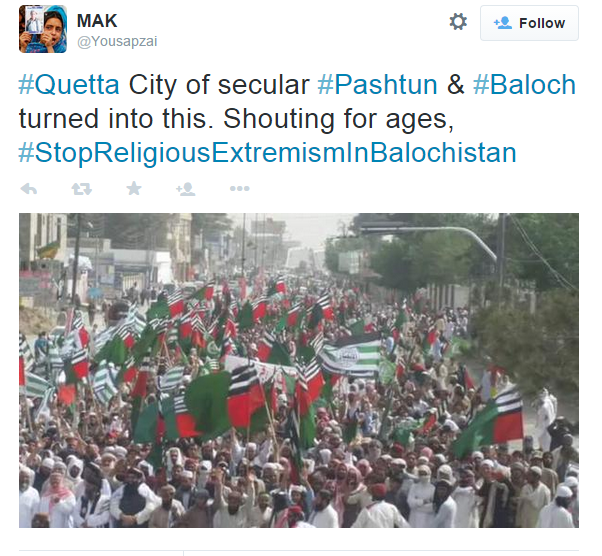
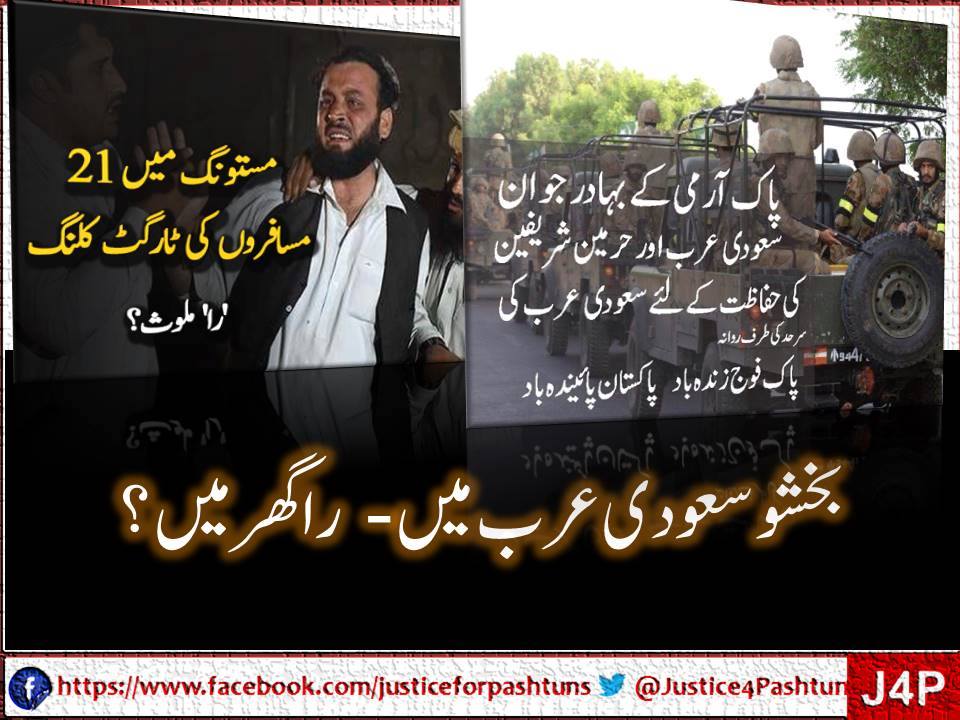


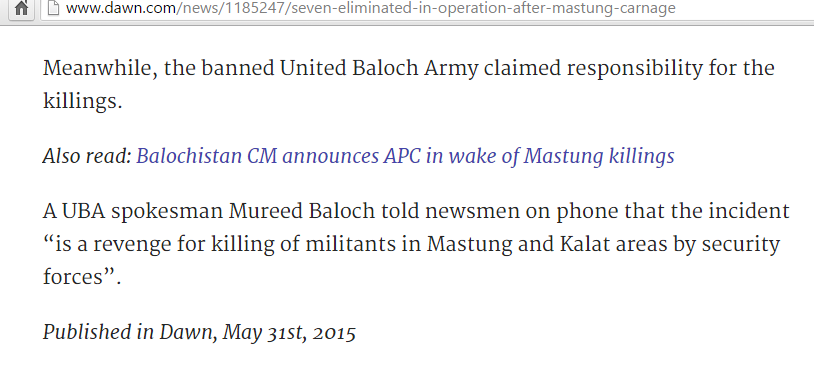
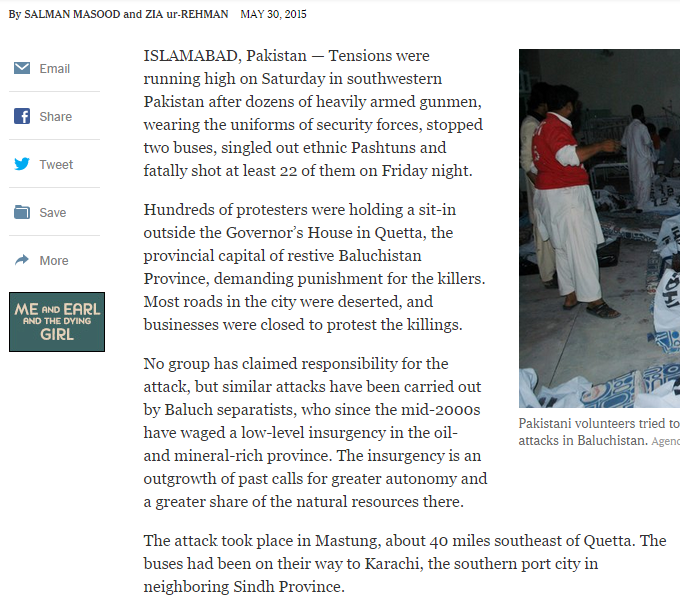












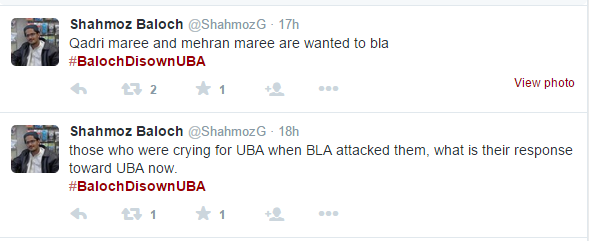



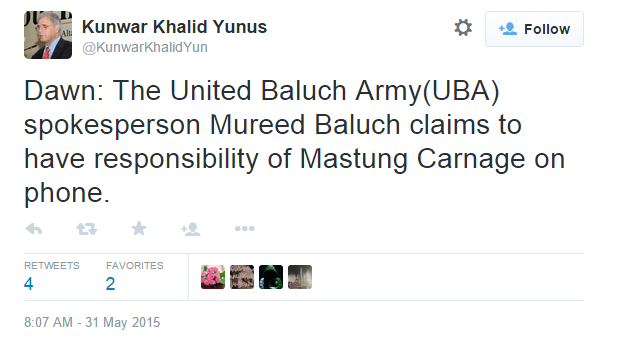
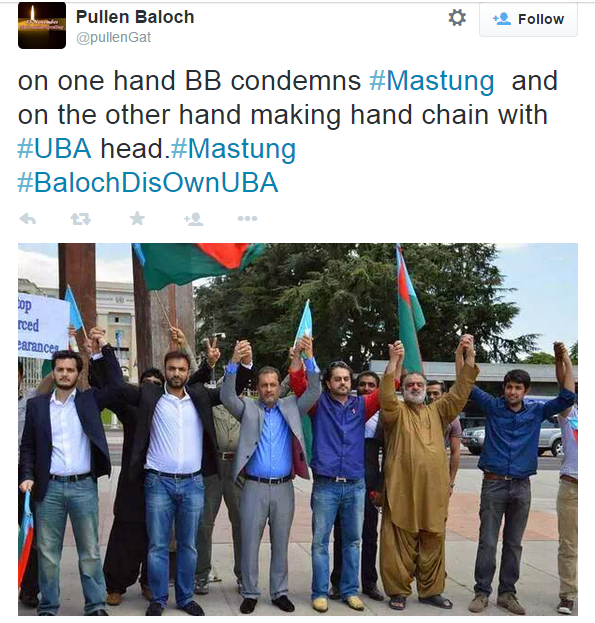



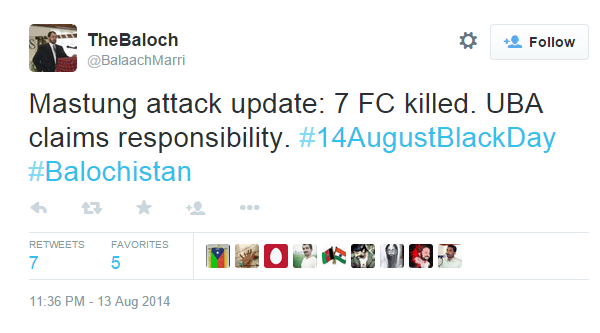
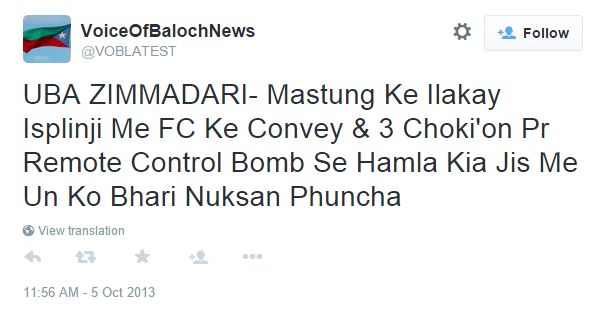
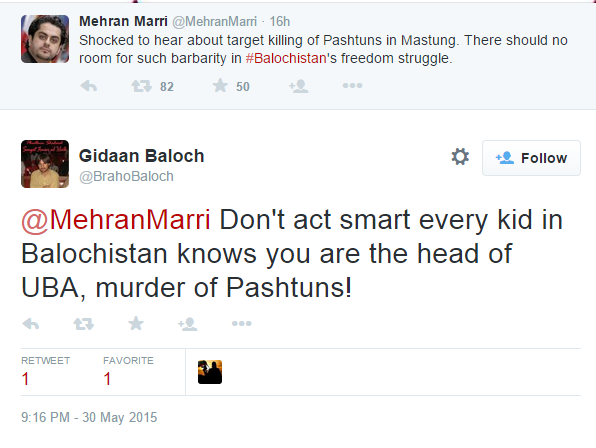
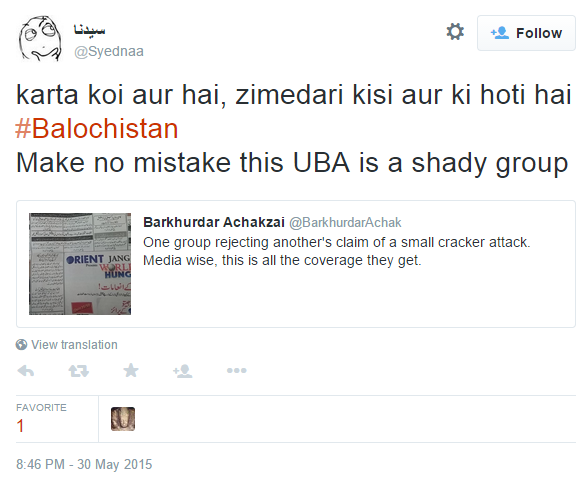
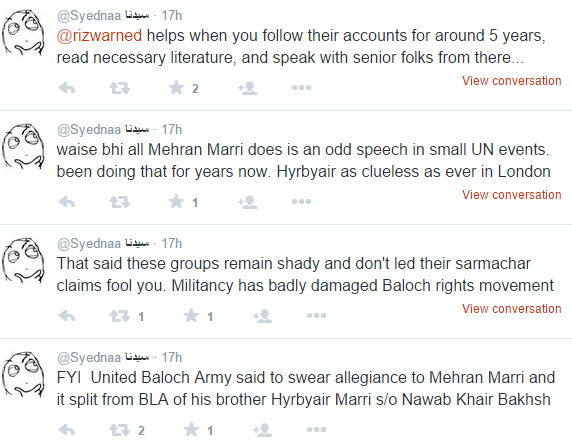
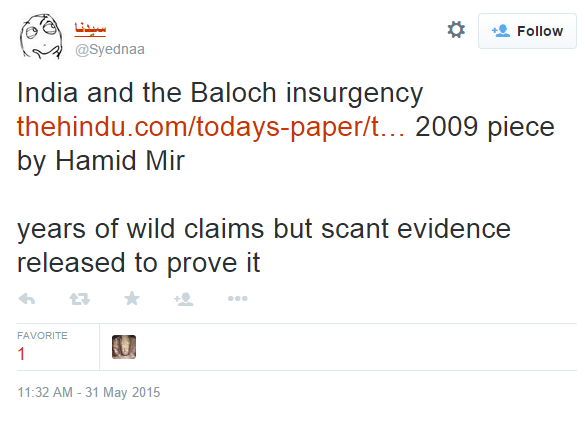
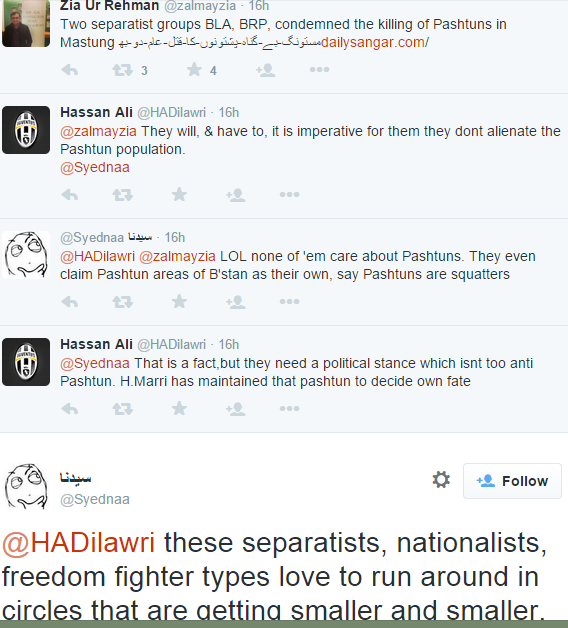
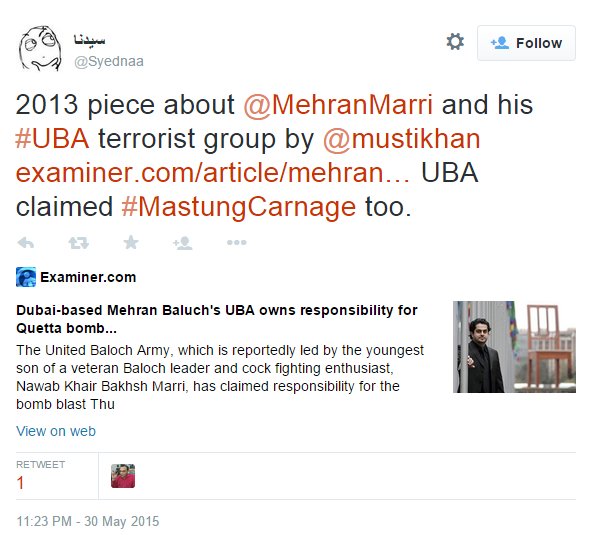
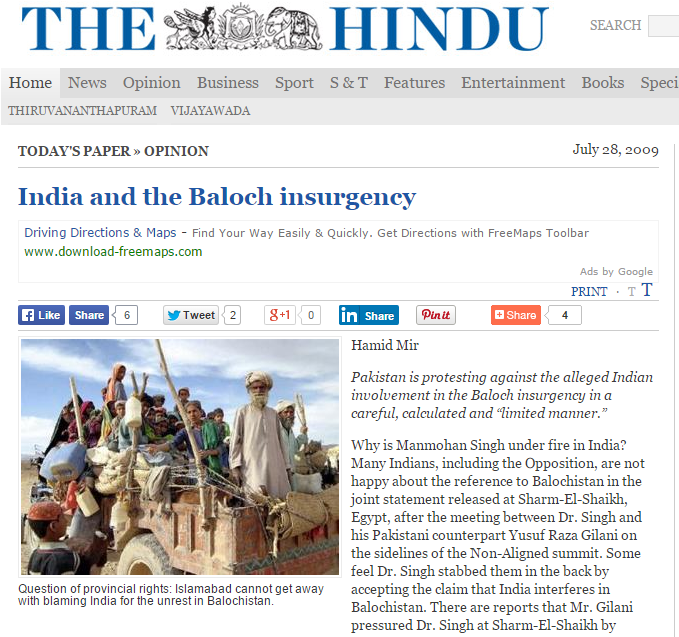
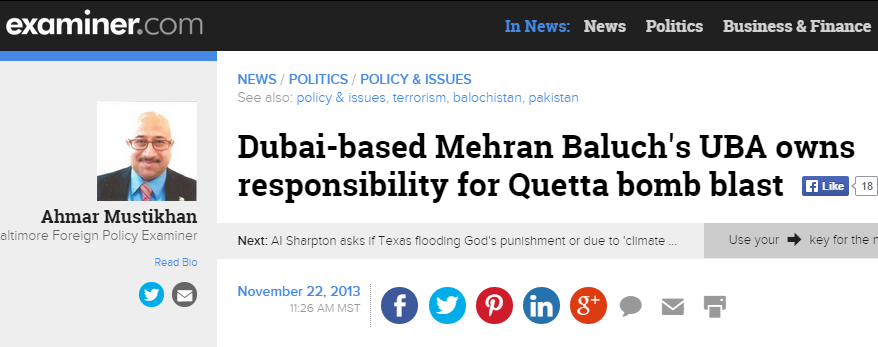
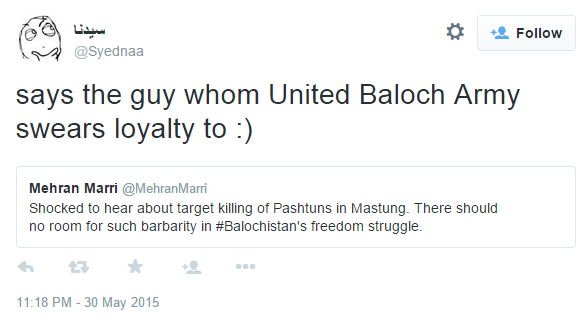
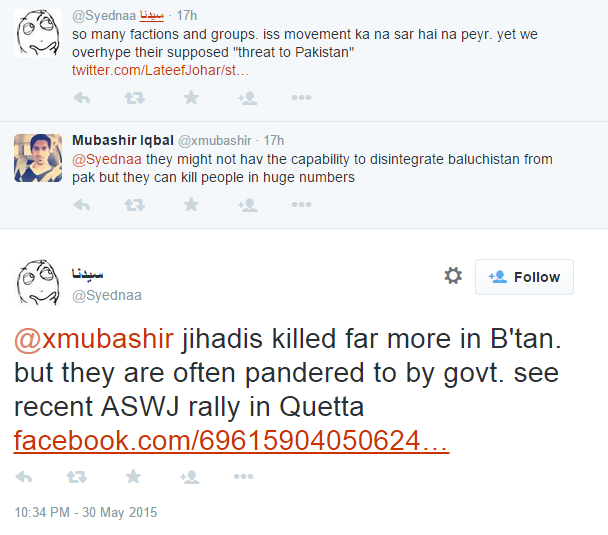
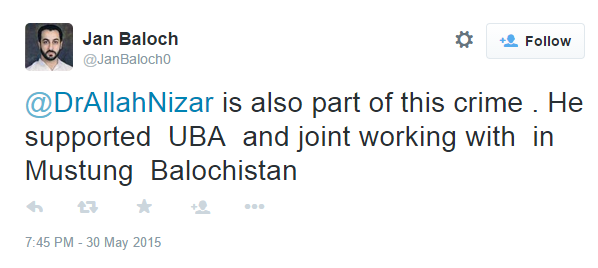
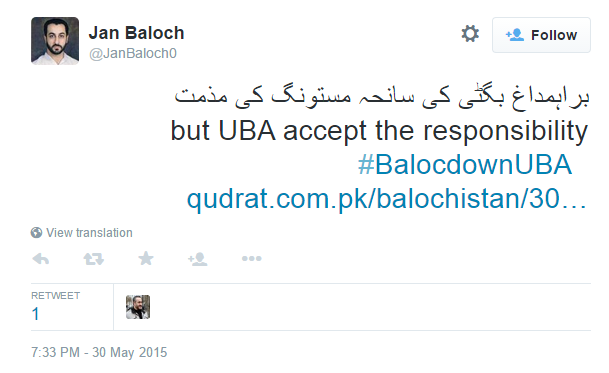
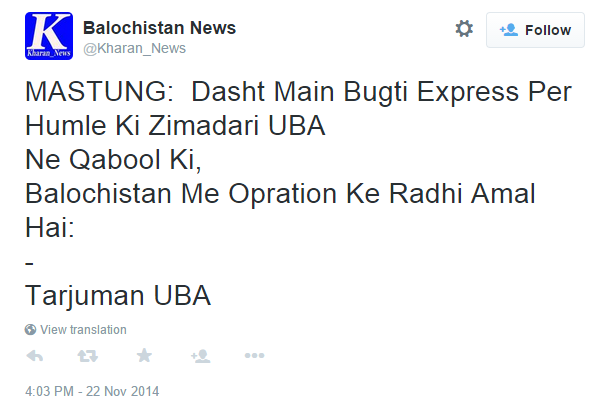
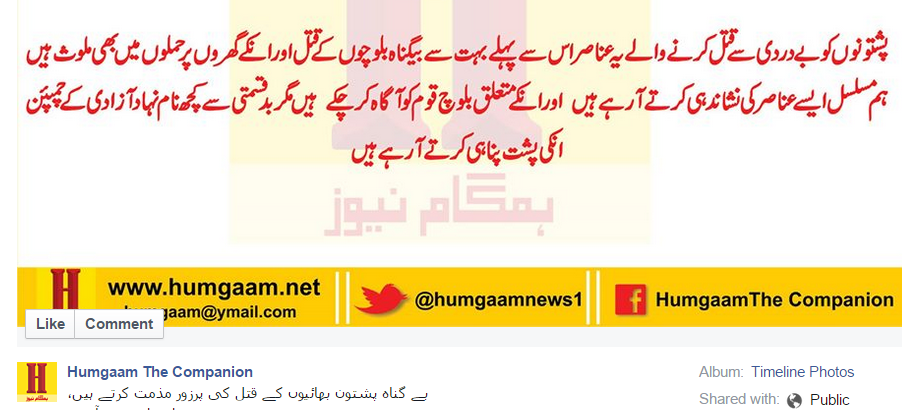
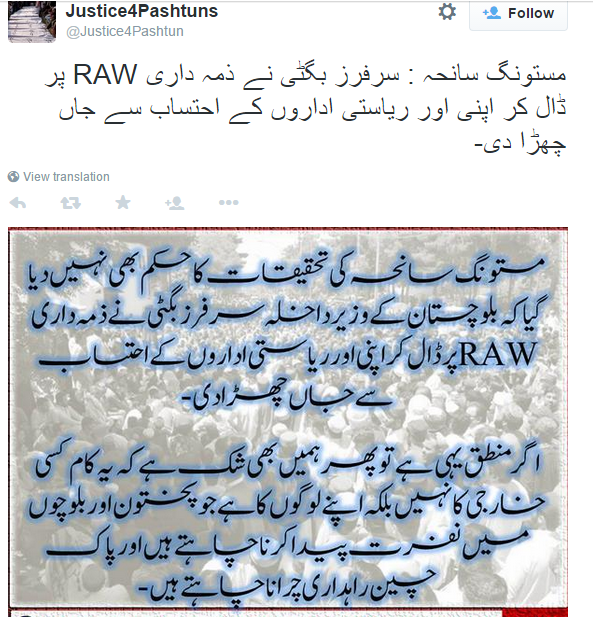
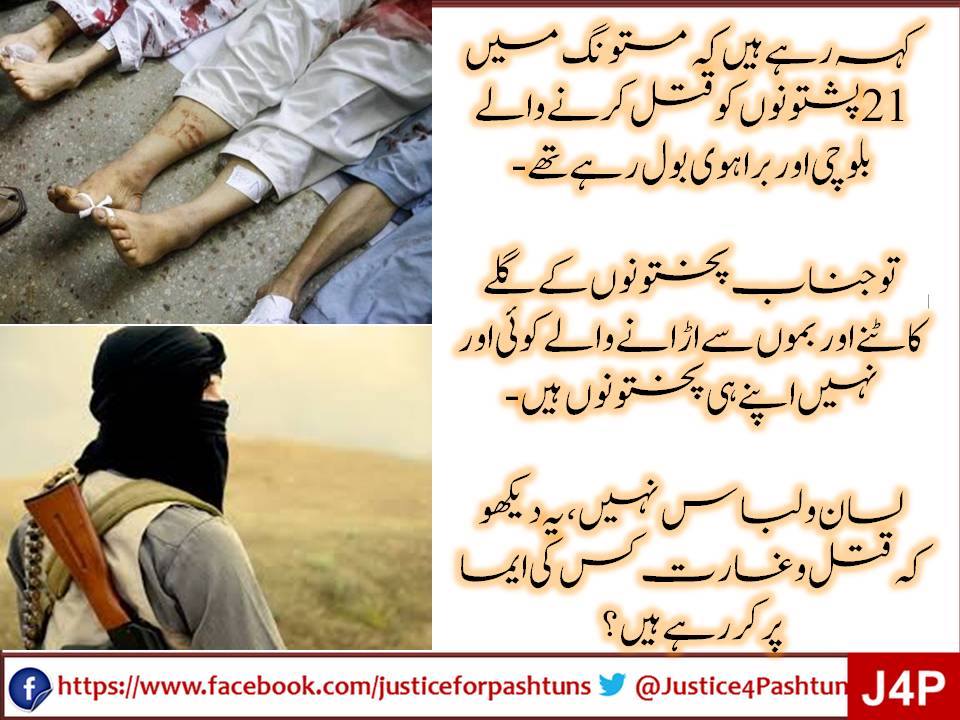
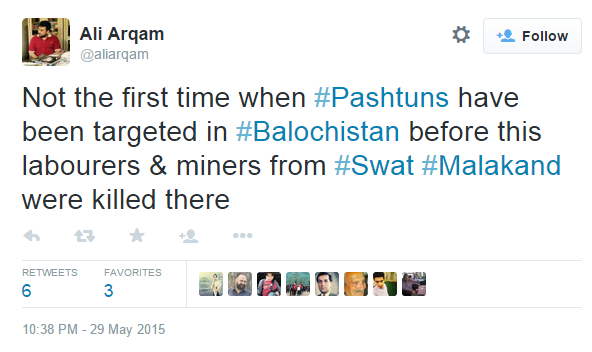
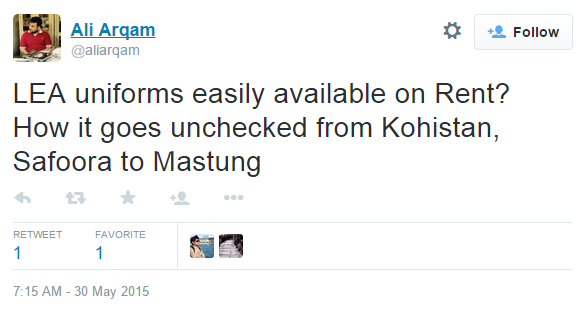
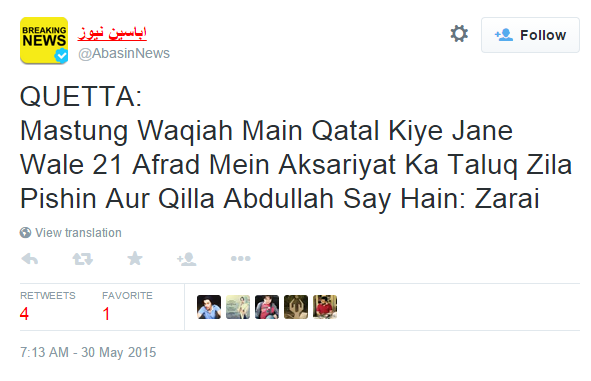
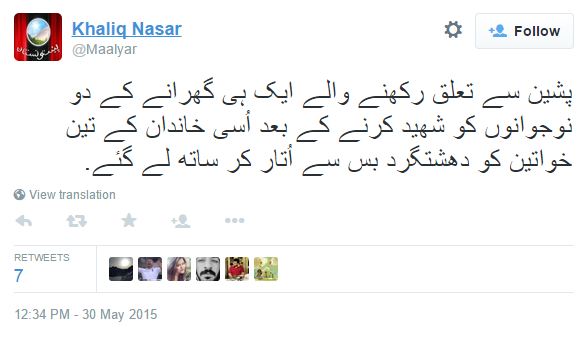
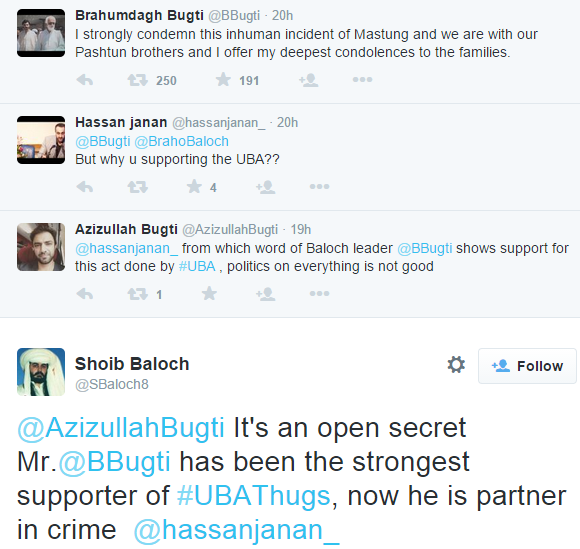
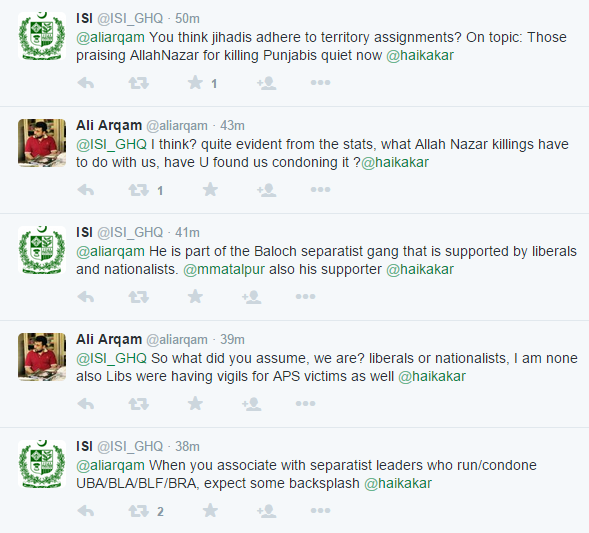
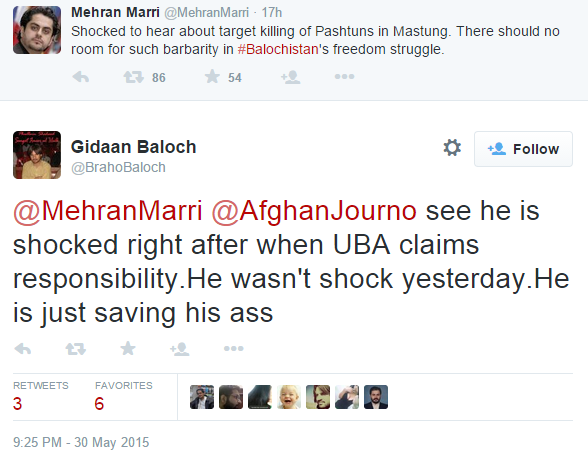

Ahmer Masti Khan
Dubai-based Mehran Baluch’s UBA owns responsibility for Quetta bomb blast
Use your key for the next article
Next: Al Sharpton asks if Texas flooding God’s punishment or due to ‘climate control’
November 22, 2013
11:26 AM MST Facebook Twitter Pinterest Linkedin Google Plus Comment
Mehran Baluch speaking at the U.N. Human Rights Council on behalf of the United Towns Agency.Play
Mehran Baluch speaking at the U.N. Human Rights Council on behalf of the United Towns Agency.
Youtube
The United Baloch Army, which is reportedly led by the youngest son of a veteran Baloch leader and cock fighting enthusiast, Nawab Khair Bakhsh Marri, has claimed responsibility for the bomb blast Thursday that left five people dead and nearly two dozen injured in provincial capital Quetta.
Mehran baluch at the Broken Chair in Geneva.
CrisisBalochistan
The U.B.A. is led by Dubai-based Mehran Baluch aka Nawabzada Zamurran Marri, according to Pakistan media reports and write-ups in the Marri family newspaper Daily Tawar. Mr. Baluch routinely speaks at the U.N. Human Rights Council as a delegate of the United Towns Agency for North-South-Dialogue.
The explosion took place on the sixth death anniversary of Nawabzada Balach Marri, Mehran Baluch’s elder brother.
Mr. Baluch’s estranged elder brother London-based Nawabzada Hyrbyair Marri heads a separate militant outfit named Baloch Liberation Army. The U.B.A. was formed as a splinter group of the B.L.A. after the two brothers allegedly had a dispute over funds — Pakistan accuses arch-rival India of providing money to the Baloch militants.. However, their eldest brother Nawabzada Jangyz Marri is opposed to militancy and is a government minister in Balochistan.
Mehran Baluch’s Swiss-based brother-in-law Nawabzada Brahumdagh Bugti heads a third militant outfit named Baloch Republican Army, which is one of the most violent.
According to well-informed sources, the U.A.E. government is closely watching Mr. Baluch’s activities in Dubai.
In a separate attack, Baloch militants hurled a grenade and killed two day laborers from Gilgit-Baltistan in Kech.
http://www.examiner.com/article/mehran-baluch-s-uba-owns-responsibilty-for-quetta-bomb-blast-that-kills-5
India and the Baloch insurgency
Amsterdam Hotel Deals – Upto 70% Off on Amsterdam Hotels. Lowest Price Guaranteed. Book Now! amsterdam-hotel.easytobook.com
Ads by Google
PRINT · T T
inShare
4
Question of provincial rights: Islamabad cannot get away with blaming India for the unrest in Balochistan.
Question of provincial rights: Islamabad cannot get away with blaming India for the unrest in Balochistan.
Hamid Mir
Pakistan is protesting against the alleged Indian involvement in the Baloch insurgency in a careful, calculated and “limited manner.”
Why is Manmohan Singh under fire in India? Many Indians, including the Opposition, are not happy about the reference to Balochistan in the joint statement released at Sharm-El-Shaikh, Egypt, after the meeting between Dr. Singh and his Pakistani counterpart Yusuf Raza Gilani on the sidelines of the Non-Aligned summit. Some feel Dr. Singh stabbed them in the back by accepting the claim that India interferes in Balochistan. There are reports that Mr. Gilani pressured Dr. Singh at Sharm-El-Shaikh by handing over a dossier of evidence alleging Indian involvement in cross-border terrorism in Balochistan and that was how the Prime Minister was forced to accept the reference to Balochistan. I was present at Sharm-El-Shaikh. Many Indian journalists were shocked on reading the joint statement. They asked me why Balochistan was mentioned in the statement. In fact, many of them, like many common Indians, were not aware of what was going on in Balochistan. Within a few hours, I started receiving calls from many Indian television channels asking what evidence Pakistan showed Dr. Singh of the alleged Indian involvement in Balochistan.
While Mr. Gilani did mention Balochistan to Dr. Singh, he never handed over any dossier. The situation in the province came in for detailed discussion during the first meeting of the Foreign Secretaries at Sharm-El-Shaikh in the evening of July 14, two days before the meeting of Dr. Singh and Mr. Gilani. Pakistani Foreign Secretary Salman Bashir told his Indian counterpart, Shiv Shankar Menon, that India must delink the composite dialogue process from action on terrorism, otherwise Pakistan would be forced to produce before the international media at least “three Indian Ajmal Kasabs” who were directly or indirectly part of the terrorist activities in Balochistan. He added that Pakistan would easily establish that the Indian Consulate in the Afghan city of Kandahar was actually a control room of terrorist activities organised by the separatist Balochistan Liberation Army (BLA). The three Indian nationals were arrested in Pakistan in the last few weeks. According to Pakistani officials, they have undeniable evidence of the links of these Indians with Baloch militants.
Mr. Bashir told Mr. Menon that Pakistan and India could not afford a blame game. If Pakistan were to come out with evidence of India’s involvement in the attack on Chinese engineers in the Gwadar port city, not only would India’s credibility be damaged but also more anti-India feelings would spread in Pakistan. The extremist forces would be the ultimate beneficiaries, Mr. Bashir said.
One must understand why the Pakistani authorities are very careful in exposing the alleged Indian involvement in Balochistan. First, this new blame game will only help the extremist forces who successfully organised the attacks in Mumbai on November 26, 2008 to derail the India-Pakistan peace process. Secondly, it will harm Afghanistan-Pakistan relations. The U.S. does not want tensions between Islamabad and Kabul at this stage because the NATO forces are trying their best to conduct a presidential election in Afghanistan in a few weeks. Thirdly, the PPP-led coalition government is aware that Balochistan is not a serious dispute like Jammu and Kashmir; it is a problem of provincial rights. Instead of internationalising the issue, therefore, Islamabad should address the problem realistically. It cannot get away by blaming India alone for the unrest in the province. It has engaged many Baloch militants in talks behind-the scenes. Good news is expected soon.
Pakistan is making noises about the alleged Indian involvement in the Baloch insurgency in a careful, calculated and “limited manner.” The U.S. magazine, Foreign Affairs (March 2009) published the report of a roundtable discussion on the causes of instability in Pakistan. Christine Fair of RAND Corporation said, “having visited the Indian mission in Zahedan, Iran, I can assure you they are not issuing visas as the main activity. Indian officials have told me privately that they are pumping money into Balochistan.”
Where is Zahedan? It is the capital of the Irani province Sistan-o-Balochistan bordering Pakistan. More than two million Balochis live on the Iranian side of Balochistan. Iran is building a big port of Chabahar in the same area with active help from India. Top Iranian leaders have repeatedly alleged that the Central Intelligence Agency is supporting the Iranian Balochis to destabilise the Islamic Republic. American journalist Seymour Hersh admitted in July 2008 that the Bush administration gave millions of dollars to the separatist Iranian group, Jandallah, which is responsible for violence in the Iranian part of Balochistan.
If Pakistan plays the India card in Balochistan, many anti-U.S. forces in Pakistan will demand to know why it is silent on the CIA’s role in Balochistan.
Keeping in view the sensitivity of the problem, it is difficult for India to openly support the Baloch insurgency because it may harm its relations with Iran. If Indians come out openly in support of the BLA, anti-Indian elements in Pakistan will quickly bracket New Delhi with the alleged great game of the U.S. against Iran.
The Balochis are Kurds of South Asia. The Kurd population is distributed in Iran, Turkey and Iraq, while the Balochis are spread over Pakistan, Iran and Afghanistan. Separatist groups in Pakistan and Iran want the Baloch areas unified. This is not acceptable to both countries. Balochistan has huge quantities of natural gas and unexplored oil reserves and is the largest Pakistani province in terms of area, covering almost 48 per cent of the country. But it accounts for only five per cent of the total population. A tribal society, it is the most underdeveloped province.
The first military operation in Balochistan was launched by General Ayub Khan in the late 1950s. The second was launched in 1974 when Iraq tried to destabilise Iranian Balochistan with the help of pro-Soviet Afghan ruler Sardar Daoud in collaboration with some Pakistani Baloch leaders. Daoud tried to exploit the slogan of independent Balochistan, on the one hand, and Pashtunistan, on the other. Afghanistan’s interference in Pakistan forced Prime Minister Zulfiqar Ali Bhutto to use Ahmad Shah Massoud and Gulbuddin Hekmatyar against the Kabul regime. The two Afghan rebels became guests of the Pakistani security forces in 1975. Later, General Zia-ul-Haq used them against the Soviet forces in Afghanistan.
Pervez Musharraf gave Gwadar to the Chinese for development in 2003. Three Chinese engineers were killed and nine injured on May 3, 2004 in a remote-controlled car bomb attack. Two months later, Pakistan claimed for the first time that India was involved in the attack. Locals were not happy over the employment of non-Balochis in the main development projects of their province. They also wanted a fairer share of royalties generated by the production of natural gas. Instead of addressing their grievances, the Musharraf regime launched a third military operation against them in 2005, further aggravating the situation.
Why must India discuss Balochistan with Pakistan? For, it will be the transit route of at least two multinational gas pipelines — one from Turkmenistan to Pakistan via Afghanistan and the other from Iran to Pakistan. India could be a beneficiary of both pipelines, which could be extended from Multan to New Delhi. A stable Balochistan will, thus, ultimately benefit India.
Pakistan, Afghanistan, Iran, China and India should join hands, and stop proxy wars in Kashmir and Balochistan. They can then change the fate of the whole region.
(Hamid Mir is the Executive Editor of Geo TV, Islamabad. email: hamid.mir@geo.tv)
http://www.thehindu.com/todays-paper/tp-opinion/article240458.ece
Hundreds Protest After Gunmen Target Ethnic Pashtuns in Southern Pakistan
By SALMAN MASOOD and ZIA ur-REHMANMAY 30, 2015
Photo
Pakistani volunteers tried to identify the bodies of some of the 22 people killed Friday night in attacks in Baluchistan. Credit Agence France-Presse — Getty Images
Continue reading the main storyShare This Page
Email
Share
Tweet
Save
More
Continue reading the main story
Advertisement
Continue reading the main story
ISLAMABAD, Pakistan — Tensions were running high on Saturday in southwestern Pakistan after dozens of heavily armed gunmen, wearing the uniforms of security forces, stopped two buses, singled out ethnic Pashtuns and fatally shot at least 22 of them on Friday night.
Hundreds of protesters were holding a sit-in outside the Governor’s House in Quetta, the provincial capital of restive Baluchistan Province, demanding punishment for the killers. Most roads in the city were deserted, and businesses were closed to protest the killings.
No group has claimed responsibility for the attack, but similar attacks have been carried out by Baluch separatists, who since the mid-2000s have waged a low-level insurgency in the oil- and mineral-rich province. The insurgency is an outgrowth of past calls for greater autonomy and a greater share of the natural resources there.
The attack took place in Mastung, about 40 miles southeast of Quetta. The buses had been on their way to Karachi, the southern port city in neighboring Sindh Province.
One of the two buses was carrying passengers from Chaman, a Pakistani town on the border with Afghanistan.
Before Friday’s shootings of the Pashtuns, militants from banned sectarian groups used to target buses of Shiite pilgrims, mostly in Mastung District, forcing them to also give up road travel in the province.
While attacks on Pashtuns in Baluchistan have occurred in the past, killing them after stopping buses and checking identity cards for their ethnicity is a new development.
A Pashtun lawmaker from the province, who spoke on the condition of anonymity because he feared retribution, said that the attack was aimed at disrupting a planned economic corridor through the province that would offer China easier sea access. The $46 billion worth of energy and infrastructure projects, pledged last month by China, center on a network of rail and road and pipeline projects.
The lawmaker said that on Thursday, during a meeting with Prime Minister Nawaz Sharif, representatives of all political parties had reached a consensus about the project as the government tries to calm suspicions that some regions would be left out of the project and that Punjab Province, the political base of Mr. Sharif, would be the only beneficiary of the increased economic activity with China.
Security officials say a search is being carried out by 200 troops across Mastung District.
Later, Mr. Sharif said he was concerned about the involvement of “foreign intelligence agencies” in destabilizing Pakistan.
Pakistani officials accuse India of supporting terrorism inside the country, and in recent months, Pakistan’s top civil and military leaders have accused India of backing separatists in Baluchistan. India has denied involvement.
Salman Masood reported from Islamabad, and Zia ur-Rehman from Karachi, Pakistan.
http://www.nytimes.com/2015/05/31/world/asia/hundreds-protest-after-gunmen-target-ethnic-pashtuns-in-southern-pakistan.html?partner=rss&emc=rss&smid=tw-nytimesworld&_r=1
Khurram Zaki said:
جو کچھ پشین کے پشتون بھائیوں کے ساتھ ہوا ہے اس کو سن کر میرا دل خون کے آنسو کے رو رہا ہے۔ انسانیت مر گئی ہے ان بیغیرتوں کی ؟ یہ کون سی حقوق کی جنگ ہے ؟ پہلے کوئٹہ کے شیعہ مسلمانوں کو اس طرح ذبح کر رہے تھے، اس سے دل نہیں بھرا تو اب پشتونوں کو ذبح اور قتل کیا جا رہا ہے، کوئی بلوچوں کی لاشیں مسخ کر کے پھینک رہا ہے، کوئی پنجابی آبادکاروں کو قتل کر رہا ہے۔ یہ ان درندوں کی انسانیت کہاں مر گئی ہے، مسلمان ہونے کا دعویٰ کہاں چلا گیا ہے ؟ پاکستان کی کیسی بھیناک تصویر پیش کی جا رہی ہے ؟ کیا یہ تکفیری دہشتگرد گروہ، یہ کالعدم اہل سنت والجماعت (سابقہ کالعدم انجمن سپاہ صحابہ)، یہ بی ایل اے کے قاتل دہشتگرد کسی رحم کے مستحق ہیں ؟
میں ان دوستوں سے جو دہشتگردی کے ان واقعات پر خاموش رہنے کو ترجیح دیتے ہیں اور ان کالعدم دہشتگرد گروہوں کے خلاف آواز نہیں اٹھاتے اپیل کروں گا کہ براہ کرم اپنی آواز بلند کریں۔ خاموشی ان مسائل کا حل نہیں بلکہ ان مسائل کی ایک وجہ ہے۔ جب شیعہ مسلمانوں کا خون بہایا جا رہا تھا تو بلوچ اور پشتون خاموش رہے، جب بلوچوں کی مسخ شدہ لاشیں ملیں تو پشتون خاموش رہے اور نتیجہ یہ نکلا کہ آج پشتونوں کو اس بے رحمی سے قتل کیا گیا۔ اگر ہر فریق اپنے اپنے وقت پر ظلم کے خلاف آواز بلند کرے تو ظالم کی اتنی مجال نہ ہو کہ وہ لوگوں پر ظلم کر سکے۔ یہ کالعدم دہشتگرد گروہ تمام پاکستانیوں کے یکساں دشمن ہیں۔ یہ لدھیانوی، فاروقی اور مینگل پاکستان کے دشمن ہیں، پاکستان کے غدار ہیں، اسلام کے غدار ہیں۔
ظلم کے خلاف آواز بلند کریں، مظلوم کا ساتھ دیں
مستونگ بس حملہ: بلوچی بروہی زبان بولنے والے دہشت گردوں نے پشتونوں کو علیحدہ کر کے قتل کیا، عینی گواہوں کی رپورٹ
مستونگ میں پشین سے کراچی جانے والے بس پر حملے میں زندہ بچ جانے والے متاثرین نے اپنے بیانات میں بتایا ہے کہ حملہ آور بلوچی بروہی زبان بول رہے تھے اور سب کا تعلق بلوچ قومیت سے تھا – عینی شاہدین نے بتایا کہ بس روکنے والے چار حملہ آور فوجی وردی میں ملبوس تھے جبکہ لیویز سیکورٹی کی چیک پوسٹ بسوں کو روکے جانے کی جگہ سے فقط دس منٹ کے فاصلے پر واقع ہے – گواہوں نے بتایا کہ دو بسوں میں سے پچاس ساٹھ سے زائد افراد کو نیچے اتارا گیا اور پشتونوں اور دیگر غیر بلوچوں کو پہاڑوں کی طرف لے جا کر گولیوں کا نشانہ بنایا گیا – پشتون اور سرائیکی بچوں تک کو قتل کر دیا گیا – ایک با ریش پشتون بزرگ کا گلا کاٹ کر ذبح کیا گیا جبکہ بلوچوں کو زندہ چھوڑ دیا گیا
بس کے اندر گھس کر ان دھشتگردوں نے لوگوں کے شناختی کارڈ دیکھے اور جو بھی پشتون تھے انہیں بس سے اُتار کر بے دردی سے شھید کیا گیا- اس سے پہلے دیوبندی بروہی بلوچ دہشت گرد، جو سپاہ صحابہ و بی ایل اے کے مشترکہ کارکن ہیں، اسی درندگی کا مظاہرہ ہزارہ شیعہ اور دیگر شیعہ مسلمانوں کے ساتھ کر چکے ہیں
یاد رہے کہ مستونگ کالعدم تکفیری دہشت گرد تنظیم سپاہ صحابہ نام نہاد اہلسنت والجماعت دیوبندی، جو کہ لشکر جھنگوی، جنداللہ اور طالبان کا اصلی روپ ہے، کا گڑھ ہے، یہاں پر اس سے قبل ہزارہ شیعہ مسلمانوں اور پنجاب، سندھ اور خیبر پختونخواہ سے ایران زیارت کے لیے جانے والے شیعہ مسلمانوں کی بسوں پر متعدد حملے ہو چکے ہیں جبکہ اس جگہ پر شیعہ اور سنی صوفی مسلمانوں کو اغوا کر کے ذبح بھی کیا گیا ان تمام حملوں کی ویڈیوز موجود ہیں – اس بات کے شواہد بھی موجود ہیں کہ بروہی بلوچ قبائل میں کالعدم سپاہ صحابہ کے کالعدم بی ایل اے اور بی ایل ایف سے گہرے تعلقات ہیں، بد قسمتی سے پاک فوج میں موجود بعض عناصر لشکر جھنگوی سپاہ صحابہ کے رمضان مینگل بلوچ دیوبندی گروپ کی پشت پناہی کرتے ہیں اور اس حقیقت سے نظریں چراتے ہیں کہ پاکستان کی دشمنی میں سپاہ صحابہ اور بی ایل اے میں اتحاد موجود ہے
یاد رہے کہ اس سے قبل بھی بی ایل اے سپاہ صحابہ کے تکفیری خوارج کی جانب سے بلوچستان میں پشتون، سرائیکی، سندھی اور پنجابی مزدوروں، پروفیشنلز اور سیٹلرز کو چن چن کر قتل کیا گیا ہے
مستونگ میں لشکر جھنگوی سپاہ صحابہ کا مسلح تربیتی کیمپ ایک بڑے دیوبندی مدرسے میں موجود ہے جس میں سینکڑوں بروہی بلوچ و دیگر کم عمر نو جوان جنداللہ اور سپاہ صحابہ کے لیے مسلح تربیت حاصل کرتے ہیں، اس حقیقت سے کوئٹہ میں ایف سی کے افسران خوب آگاہ ہیں لیکن اس خام خیالی میں نظریں چراتے ہیں کہ بی ایل اے کے خلاف جنگ میں سپاہ صحابہ لشکر جھنگوی ان کا ساتھ دے گا جبکہ حقیقت اس کے بر عکس ہے
جب تک رمضان مینگل، رفیق مینگل، شفیق مینگل اور منظور مینگل کو گرفتار کر کے پھانسی پر نہیں لٹکایا جاتا اور ان کے پشت پناہوں کا کورٹ مارشل نہیں کیا جاتا، تب تک مستونگ اور کوئٹہ میں سپاہ صحابہ لشکر جھنگوی اور بی ایل اے کے دہشت گردوں کے کیمپ قائم رہیں گے اور معصوم ہزارہ شیعہ، دیگر شیعہ، پشتون، سنی صوفی اور دیگر پاکستانی قتل کیے جاتے رہیں گے
https://www.facebook.com/LetUsBuildPakistan/videos/vb.265291019560/10153344026644561/?type=2&theater
Pashtun massacre in Mastung and the Baloch militants’ hall of shame https://lubpak.com/archives/337048
BLA-ASWJ terrorists, led by Ramzan Mengal, massacre 20 Pashtun, Sindhi and Saraiki bus passengers in Mastung https://lubpak.com/archives/336956
مستونگ بس حملہ: بلوچی بروہی زبان بولنے والے دہشت گردوں نے پشتونوں کو علیحدہ کر کے قتل کیا، عینی گواہوں کی رپورٹ https://lubpak.com/archives/337202